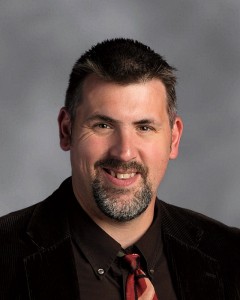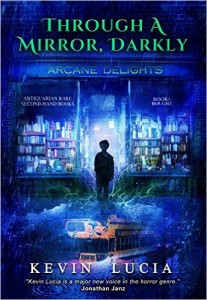As part of my ongoing series on Christian creatives in the general market, I was thrilled to catch up with author KEVIN LUCIA. Kevin’s stories have appeared in numerous outlets including Shroud magazine, Cthulu Mythos, and Shock Totem. His most recent novel, Through a Mirror, Darkly, not only has a killer cover, but has been receiving some great critical reviews. Kevin was gracious enough to answer a few questions about the difficulties and opportunities of being a Christian while writing for a mainstream audience.
* * *
MIKE: Kevin, thanks for joining us today. When we first met, you were still debating shopping your stories in the CBA (Christian Booksellers Association). Obviously, that changed and since then, you’ve built a significant platform writing for the “secular” market. This has to be a bit of a tightrope. So how do you navigate being a Christian while writing fiction for a general market audience?
KEVIN: I guess it depends largely on your perspective. Are you planning Sunday School lessons for those in the church to learn from, or creating art for all mankind to appreciate and enjoy? In my opinion, art (and even that’s so subjective a field), has a much stronger impact when it works through subtleties and thematic treatments. At the end of the day, people are probably going to easily guess my worldview and beliefs, based on the subject matter I choose to write about. There may not be anything inherently “Christian” about any of my stories, there may not even be any Christians in the story, and the stories may also be pretty dark and damn depressing, but they dwell consistently on topics of faith, belief in a higher power or the existence of a higher power, good vs. evil, right vs. wrong, or the inherent flaws that humanity – humanity on its own – suffers from: pride, anger, jealousy, vice, bigotry, hatred. To me, even if I use profane language or drug use or violence or even things of sexual nature to build characterization, if I’m highlighting humanity’s strengths – found in faith, belief, love, endurance, courage and bravery – or shining an uncompromising light on our weaknesses, I’m remaining true to my faith and my worldview.
And on a personal note, I tried writing a “Christian novel” with all the right words and doctrine and theology. There was no joy in the endeavor. It felt like a student dutifully filling out their homework, and nothing more. And ironically, my “spiritual temperature” was far LOWER when I was trying to write a “Christian” novel.
MIKE: Christian writers often view their craft in terms of a “calling” or a “ministry.” That seems a lot easier to do when writing just for Christians and selling your books in the church library. What about you? Do you consider your writing career a “spiritual calling” or “ministry”?
KEVIN: Again, it depends. When God made me, He stamped lots of things on me: Father, Husband, Teacher, Athlete, Lover of Books…and Writer. I’ve wanted to be a writer as long as I’ve loved books, so it was obviously meant to be. But as a horror writer, my “ministry” comes out in different ways: how I conduct myself when around my peers (mostly secular) at Conventions. How I treat other writers. How professionally I conduct myself when working with publishers, or, my work ethic as a writer, or when I’ve worked for publications as an editor. Am I kind and considerate and polite? Do I bother getting into all the “scuffles” that break out in the genre, or I’m focused on my writing, doing it for the love of it? I’ve had several people in the horror industry comment on my noticeable faith and spirituality – without me ever telling them about it, or even talking about it very much. That, to me, is my ministry.
depends. When God made me, He stamped lots of things on me: Father, Husband, Teacher, Athlete, Lover of Books…and Writer. I’ve wanted to be a writer as long as I’ve loved books, so it was obviously meant to be. But as a horror writer, my “ministry” comes out in different ways: how I conduct myself when around my peers (mostly secular) at Conventions. How I treat other writers. How professionally I conduct myself when working with publishers, or, my work ethic as a writer, or when I’ve worked for publications as an editor. Am I kind and considerate and polite? Do I bother getting into all the “scuffles” that break out in the genre, or I’m focused on my writing, doing it for the love of it? I’ve had several people in the horror industry comment on my noticeable faith and spirituality – without me ever telling them about it, or even talking about it very much. That, to me, is my ministry.
MIKE: A common complaint of Christian authors seeking to write for a broader audience is feeling stuck in no-man’s land, struggling to communicate spiritual concepts to non-religious readers. As a result, they often find themselves stuck between two markets. What would you advise an author who says their story is “too worldly” for the Christian market and “too Christian” for the general market?
KEVIN: All snarkiness aside – even considering my own misgivings in writing Christian fiction – I’d first suggest they get a real HONEST assessment of where their growth is as a writer. I hid behind that excuse for many years, when in reality I wasn’t a strong writer at the time. I’ve found that while the “too worldly” for the Christian market may hold some validity, if you’re striving for “art” and not “Sunday school lesson,” if your writing is of high quality, then you’ll find your readers in the secular market, (though it may be harder to find a “Big 5” publisher.) As a horror writer, I’ve had no issues finding readers of all stripes, and have been pleasantly surprised as to how many of them consider themselves to be Christians. There are thousands of Christian readers who don’t read Christian fiction at all. I’m one of them…
MIKE: So what advice would you give to a Christian novelist who is seeking to change from writing for the Christian market to the general market?
KEVIN: As a writer – focus on the story you want to tell. Let the story “be the boss,” as Stephen King says in On Writing. Even if you throw every Christian character and subplot to the wind, WHO YOU ARE will still shine through. People will still be able to tell. Although, I feel this is kind of a moot point. Either you’re the kind of Christian writer who works through themes, or you prefer a “three points and a prayer” storytelling method. Myself, I’ve never wanted my writing to inform or influence anyone’s spiritual journey. I’m a storyteller, a gabber, a teller of tall tales and yarns, not a theologian. If my stories edify or merely entertain, I’m equally happy both ways. Professionally, I’m less sure on that score. I ultimately decided to begin my career in the secular market, because I figured it would be easier to write something for the Christian market AFTER, than to try and cross over to the secular market after starting my career in the Christian market.
* * *
Great stuff, Kevin!















As a Christian and an aspiring writer whose love is dark fiction, I am encouraged reading this. In my experience, it’s common for Christians to see things in black and white when it comes to using our God-given gifts; they’re either used to explicitly evangelize or you’re wrong. I used to be one of those people, which is why I hesitated to even write. I appreciate you covering this topic, and I am thankful for people like Kevin Lucia who are paving the way for Christian authors.
I need to add, too, that my thirteen-year-old son read Through a Mirror, Darkly and loved it. One night, when he was reading before going to sleep, he came out of his room excitedly holding his Kindle. He said, “Mom, I think this author is a Christian.” Obviously, Kevin’s faith shines through in his work.
That does my heart good to hear, Sara. Thanks for sharing!
That’s so awesome, Sara. My son (12 yrs) does the same thing when he’s watching a movie or reading a book — or watching the YouTube channels of gamers he admires. When he finds a clue that the author might share his faith, he gets pretty excited. And I love watching him figure these things out and analyze stories from the worldview he’s been taught (even though we enjoy a variety of Christian and non-Christian entertainment).
Mike & Kevin,
Thanks for this insightful and encouraging interview. I find myself right now transitioning to the secular market with a fantasy series I’m writing. And I’m doing so with a lot of trepidation. It’s a whole new world. But your experiences show me we can bring our God-inspired stories to the “non-Christian” market and still remain true to our faith.
Thank you.
“I’d first suggest they get a real HONEST assessment of where their growth is as a writer. I hid behind that excuse for many years, when in reality I wasn’t a strong writer at the time.”
This is an excellent point. The other thing I think muddies the waters is that when a writer hasn’t embraced the concepts you talk about in this interview (being confident in who you are and that your faith will shine through because it’s part of who you are) then his/her writing reflects that. There is a lack of confidence, a sort of schizophrenia, stories that hover somewhere in between two markets.
Even apart from skill, being of two minds about what’s “acceptable” or which market you’re writing for will undermine your stories. I’ve wrestled with that a lot myself, and feel like I’m starting to get my feet under me. We’ll see. Heh.